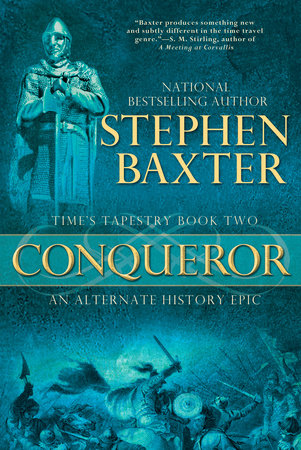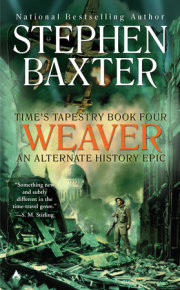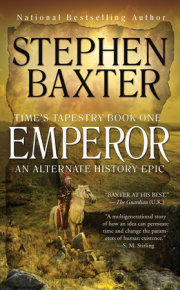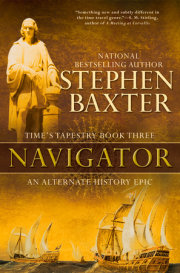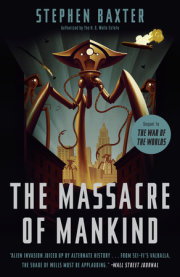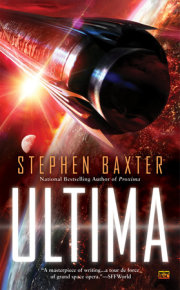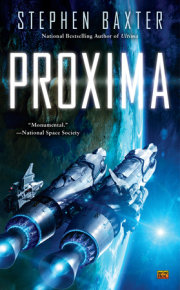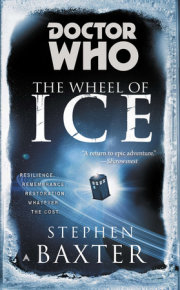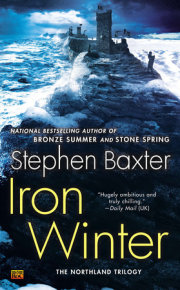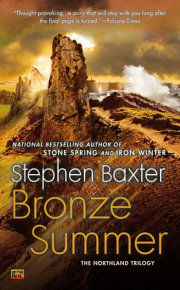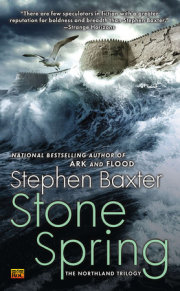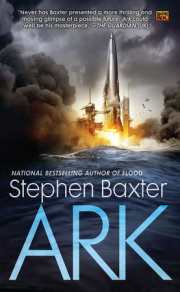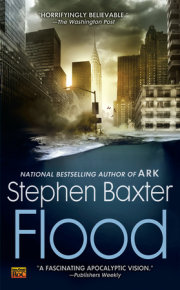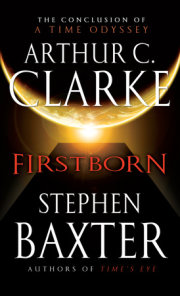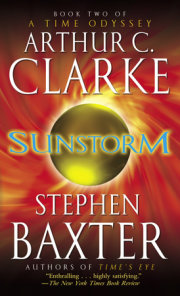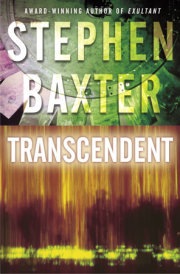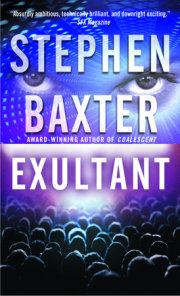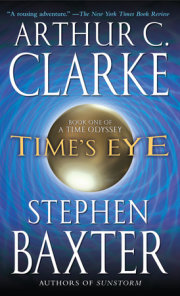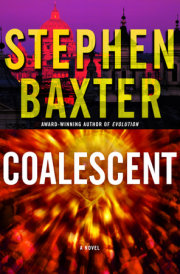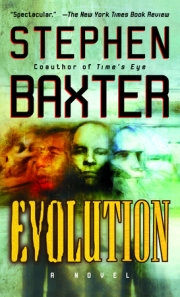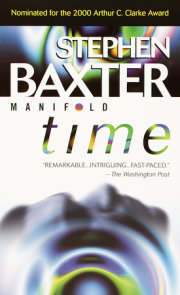Table of Contents
Title Page
Copyright Page
I - MERCENARY AD 607
I
II
III
IV
V
VI
VII
VIII
IX
X
XI
II - SCRIBE AD 793
I
II
III
IV
V
VI
VII
VIII
IX
X
XI
XII
XIII
XIV
XV
XVI
XVII
XVIII
XIX
XX
XXI
III - SCHOLARAD 878-892
I
II
III
IV
V
VI
VII
VIII
IX
X
XI
XII
XIII
XIV
XV
XVI
XVII
XVIII
XIX
XX
XXI
IV - CONQUERORAD 1064-1066
I
II
III
IV
V
VI
VII
VIII
IX
X
XI
XII
XIII
XIV
XV
XVI
XVII
XVIII
XIX
XX
XXI
XXII
XXIII
XXIV
XXV
XXVI
XXVII
EPILOGUE
Afterword
THE BERKLEY PUBLISHING GROUP
Published by the Penguin Group
Penguin Group (USA) Inc.
375 Hudson Street, New York, New York 10014, USA
Penguin Group (Canada), 90 Eglinton Avenue East, Suite 700, Toronto, Ontario M4P 2Y3, Canada (a division of Pearson Penguin Canada Inc.)
Penguin Books Ltd., 80 Strand, London WC2R ORL, England
Penguin Group Ireland, 25 St. Stephen’s Green, Dublin 2, Ireland (a division of Penguin Books Ltd.)
Penguin Group (Australia), 250 Camberwell Road, Camberwell, Victoria 3124, Australia
(a division of Pearson Australia Group Pty. Ltd.)
Penguin Books India Pvt. Ltd., 11 Community Centre, Panchsheel Park, New Delhi—110 017, India
Penguin Group (NZ), 67 Apollo Drive, Rosedale, North Shore 0745, Auckland, New Zealand
(a division of Pearson New Zealand Ltd.)
Penguin Books (South Africa) (Pty.) Ltd., 24 Sturdee Avenue, Rosebank, Johannesburg 2196,
South Africa
Penguin Books Ltd., Registered Offices: 80 Strand, London WC2R ORL, England
This is a work of fiction. Names, characters, places, and incidents either are the product of the author’s imagination or are used fictitiously, and any resemblance to actual persons, living or dead, business establishments, events, or locales is entirely coincidental. The publisher does not have any control over and does not assume any responsibility for author or third-party websites or their content.
CONQUEROR
Copyright © 2007 by Orion Books.
All rights reserved.
No part of this book may be reproduced, scanned, or distributed in any printed or electronic form
without permission. Please do not participate in or encourage piracy of copyrighted materials in
violation of the author’s rights. Purchase only authorized editions.
ACE is an imprint of The Berkley Publishing Group.
ACE and the “A” design is a trademark belonging to Penguin Group (USA) Inc.
eISBN : 978-1-101-00688-7
Place names:
Ad-Gefrin, Yeavering
Aescesdun, Ashdown
Aethelingaig, Athelney
Armorica, Brittany
Banna, Birdoswald
Bebbanburh, Bamburgh
Brycgstow, Bristol
Caldbec Hill, Hastings
Cippanhamm, Chippenham
Eoforwic, Eburacum, Jorvik, York
Escanceaster, Exeter
Ethandune, Edington
Foul Ford, Fulford
Haestingaceaster, Hastings
Hagustaldasea, Hexham
Hamptonscir, Hampshire
Lindisfarena, Lindisfarne
Lunden, Lundenwic, Lundenburh, Londinium, London
Maeldubesburg, Malmesbury
Pefensae, Anderida, Pevensey
Reptacaestir, Rutupiae, Richborough
Sandlacu, Senlac Ridge
Snotingaham, Nottingham
Stamfordbrycg, Stamford Bridge
Sumorsaete, Somerset
Wealingaford, Wallingford
Westmynster, Westminster
Wiltunscir, Wiltshire
R Sabrina, Severn
R Tamesis, Thames
Timeline
AD418
The Menologium of the Blessed Isolde
AD 418
(Free translation from Old English, with acrostic preserved.)
PROLOGUE
AD 1066
After a year of total war, Lunden was an angry city. Under an iron-grey December sky, no man walked alone in the alleys. The King even had to have Westmynster ringed by troops.
The mood within the cold, cavernous abbey church was febrile too. Men walked in huddles with their retainers, their weapons visible, their glances furtive and suspicious.
It was Christmas Day, 1066. The day the King of England was to show his crown to those who had fought for him, and to those who still called him a bloodstained usurper.
It was in this atmosphere that Orm met Sihtric.
The priest, small, cunning, looked Orm in the eye. ‘Orm the Viking.’
There was enough of his sister in Sihtric’s blank blue eyes to remind Orm of Godgifu - and of how he had cut her down on Sandlacu Ridge, at the climax of the battle men called Haestingaceaster. Orm’s heart twisted. ‘I was not expecting to see you here,’ he said evasively.
‘But I thought I would meet you,’ Sihtric said. ‘You did well in the battle, Orm, and in the campaign of revenge since. Your paymasters must be pleased with you.’
Orm stood straight. ‘I won’t justify myself to you, priest. In a year like this a man must survive as best he can.’
‘Oh, I’m not judging you,’ Sihtric murmured. ‘I am compromising with the victors too. If I work with the bishops perhaps I can mitigate the harm done to the people, who are after all my flock. But I am not proud of it,’ he said. ‘We meet in shame, you and I.’
Orm smiled thinly. ‘Despite your endless nagging over your prophecy.’
‘The Menologium of Isolde. A four-hundred-year programme of historical design that came to a climax on Sandlacu Ridge - all for the birth of an Aryan domain.’
‘I never understood who your “Aryans” were.’
‘Well, you always were a fool. Us, Orm! English and Northmen together. An empire for ten thousand years - or so the Weaver of time’s tapestry intended ...’
There was a commotion, a rumble of anticipation. Men separated, making way.
The King marched down the aisle of the abbey church. Archbishop Ealdred walked ahead of him, magnificent in his embroidered silk and purple-dyed godweb, bearing the new crown of England, a circlet of gold embedded with jewels. From the heaviness of his gait Orm suspected that the King was wearing a coat of chain mail under his golden cloak. He feared assassins, even here.
Leaden-footed, stiff, the King looked exhausted after his year of war. But as he walked he glared left and right. None of the nobles dared meet his eye.
‘I think I wish your future had come about,’ Orm said impulsively. ‘I wish I were readying a longship to sail to Vinland in the spring, with Godgifu at my side, and my child in her belly.’
‘Yes,’ Sihtric muttered. ‘Better that than this. This is wrong. We are in the wrong future, my friend. And we are stuck with it.’
‘But could it have been different?’
Sihtric snorted. ‘You were there, Viking. You know how close it came ...’
I
MERCENARY AD 607
I
Wuffa liked to smash windows in the dead city.
He walked north through the empty streets, sling and stone in hand, knives at his belt. He whistled a sad fireside song of the brevity of life. It was late afternoon, and the low southern sun cast long shadows from the heaps of rubble. It was a long time until night, but already the hairy star was visible, its streaming tail a banner sprawled across the pale spring sky. He disturbed rabbits and rats and mice, and a few birds pecking for food in the gaunt shells of ruined buildings. The city was so old that it didn’t even smell any more, save of the green things, the weeds and grass that pushed their way through the cobbles.
The comet, the hairy star, alarmed many men. The Saxons had always shunned the old stone cities. Here they had built a new trading settlement, by the bank of the river to the west of the walls. Certainly Wuffa’s brothers wouldn’t risk catching Woden’s eye at such a time by walking alone in the ghost-plagued ruins of an ancient city. But Wuffa was of a practical turn of mind. It was a big world, and Woden would have more important things to worry about than a lone youth looking for a bit of sport.
In this, as it turned out, he was wrong. Wuffa’s life would turn today. He would always wonder if he had after all angered the gods of the city, or the sky - or perhaps he had fallen under the cold gaze of the Weaver, who worked men’s lives like threads on his iron loom.
There. A wall stood tall, facing south towards the river. It was all that was left of a collapsed building, an unlikely relic somehow resisting the weather. And the low sunlight picked out a square of gold, a window still paned with unbroken glass, high but not beyond his reach. Perfect.
He selected a loose cobble from the road and took his leather sling. He stood before the ragged wall, squinted up and hurled. The cobble pinged against the wall perhaps half an arm’s length below the window, and birds clattered up from a gaping frame. Wuffa picked up another cobble and launched again. This time the glass burst with a soft chime that echoed from the jutting walls.
Satisfied, he looked for another target.
Of course he should have been at work. Today had been a busy day, for a whole fleet of Norse ships had come sailing up the great river to be berthed and unloaded. Wuffa’s father Coenred was employed by Aethelberht, the Kentish overking who owned the city, to oversee the trade that trickled through the huge old concrete wharves along the river. Wuffa, twenty years old, the second son of Coenred’s third wife, was expected to do his share. But trade bored him. He especially hated the desolating stink of the slave pens. Recently there had been hundreds of slaves to be shipped out, British-Roman captives from the German kings’ campaigns in the west and north.
And he itched to fight. Wrestling matches with his brothers were no longer enough. There was no peace in Britain, and it wouldn’t be hard to find an army to fight for, a war to win, a fortune to make, although he would have to leave home to do it.
In the meantime all he wanted was another window to smash. He bent to pick up another cobble.
He saw something move. Across the street, beyond a low wall: large, heavy, a flash of golden hair. Without thinking Wuffa pivoted and fired off the cobble. He heard a satisfying thud of rock on flesh.
‘Ow!’ His target straightened up. It was a man, dressed in a leather tunic and trousers, with a ragged shock of blond hair. He was carrying some kind of spade. And he was clutching his balls. He glared at Wuffa and began striding across the road. He was big, with muscles that bulged through his sleeves. He spat abuse in a Norse tongue of which Wuffa could make out only one word: ‘Arsewipe’.
Wuffa was a Saxon warrior, son of Coenred, and he stood his ground, his hand hovering at the hilt of his seax, his bone-handled knife.
The big Norse came to a halt not an arm’s length from Wuffa. The Norse was about Wuffa’s age, around twenty, and they were both blond and fair-skinned, and dressed similarly in leather tunic and trousers. But Wuffa wore his hair in the Saxon style, shaved at his forehead and long at the back of his neck, while the Norse wore his yellow mane loose and ragged.
Wuffa recognised this man. ‘I know you,’ he said in his own tongue. ‘You’re from the fleet at the wharf.’
The Norse fired out more insults.
Wuffa tried again, in Latin. ‘I know you.’
At least that stopped the flow of abuse. ‘So what, arsewipe?’
Britain was an island populated by Roman-British, Germans and Irish, with traders always streaming over from the continent. Most adults knew a little Latin, a relic of empire, the only common tongue. This young Norse was no exception. Though he evidently didn’t know the Latin for ‘arsewipe’.
‘I am Coenred’s son. We are unloading your boats—’
The Norse kicked a loose rock. ‘And is this how you greet your trading partners, with a cobble in the balls?’
Wuffa held his gaze. They both knew they had a choice here, either to fight it out or resolve their difference. Wuffa said, ‘I should be working. Even if you don’t kill me my father will finish me off for you.’
The Norse laughed. But he warned, ‘You have to say it.’
‘All right. I apologise.’
The Norse grunted. ‘Very well. Your little girl’s throw did not harm me anyhow.’
Thus the matter was closed.
‘I am Wuffa, son of Coenred.’
The Norse nodded. ‘Ulf, son of Ulf.’ He squinted up at the wall. ‘If you are not hunting Norsemen’s balls, what are you doing?’
‘Smashing windows,’ Wuffa said, a bit ashamed. He hefted his sling. ‘It helps improve my aim.’
‘Of course it does.’
‘And you?’
Ulf showed him his spade. ‘Looking for coins. Sometimes the Britons bury their treasures, in the hope of returning some day.’
‘They never do.’
‘And if they did they would be disappointed, for Ulf the treasure-seeker has been there before them. Well, arsewipe. Do you want to continue throwing stones like a baby or will you help me dig?’
There was a kindred spirit here, Wuffa thought. He pocketed his sling. ‘Let’s dig. But stop calling me “arsewipe”. How do you know where to look? ...’
Ulf held up his hand. ‘Hush. Can you hear that?’
It was singing, voices joined in a melody high and clear as the sky, drifting on the afternoon breeze.
The young men exchanged a glance. Postponing their treasure hunt they set off across the broken city, curious, ambitious, unperturbed by the monumental ruins around them, living in their own present.
II
They travelled across the city, heading towards the ruined fortress built into the south-eastern comer of the circuit of the city walls. The singing came from a massive stone-walled building with a roof of red tiles that stood not far from the walls. Its huge wooden doors were flung open, and the setting sun cast low light into long aisles.
A group of people had gathered before the open doors. Men, women and children, there must have been four, five hundred of them, Wuffa thought. Drawn up in a loose column they had begun walking slowly along the road down towards the docks. A man in colourful vestments led them; he wore a pointed hat and carried what looked like a shepherd’s crook. The column was flanked by parties of Saxons - warriors, evidently hired to protect the pilgrims. The Saxons talked amongst themselves, chewed on bits of root, and eyed up the prettier women.
The pilgrims were Britons; Wuffa could tell from their clothes and hair. The men all wore their hair short and clean-shaven. The women mostly had their hair in neat plaits and buns. Men and women alike wore sleeveless tunics under cloaks, and were adorned with bracelets and armlets and necklaces. One or two of the men even wore togas, long swathes of cloth that scraped across the dusty ground. But they were mostly dressed for travel, and laden with baggage. Even infants old enough to walk bore bundles on their backs and heads. They looked strained, unhappy, fearful and uncertain.
They were all Christians, most likely. In among them were clergy wearing tonsures cut in the British style, with the front of the head shaved from ear to ear and the hair worn long down the back. That man who led them, though, wore a Roman tonsure, with the crown of his head shaved in a disc.
And as they walked the pilgrims sang, creating a chilling, unearthly music that rose up to the sky, where the hairy star shone ever brighter.
Ulf gaped at all this. ‘So what’s the big building? A warehouse?’
‘No. It’s a church. They call it a cathedral.’ The cathedral was younger than the city. It was built of reused stone; in places where the facing stone had fallen way you could see bits of pillars and statues broken up and used as core. But the reused roof tiles were cracked, the glass in the windows smashed. Nothing was new here, Wuffa thought; there were only degrees of age.
Ulf asked, ‘Was this big church built by your great king?’
‘No, Aethelberht’s church is over there.’ Wuffa pointed north.
‘Why do you need two churches?’
‘The King follows Roman Christianity. He was converted by Augustine’s bishops. This church was built by British Christians.’
Ulf thought that over. ‘I’m more confused.’
‘The walkers are all British Christians. I think. The man leading them is a Roman, a bishop.’
‘So why are they following him, if he’s not one of theirs?’
‘I—’ Wuffa spread his hands. He knew next to nothing about Christians. He only observed their behaviour from outside, as if they were exotic birds. ‘They are leaving for good. You see it all the time. Look.’ Wuffa pointed. ‘See the jewellery? They are wearing their wealth. These are the people who bury your coin hoards. Their church is organising the flight.’
‘Where are they going?’
‘To the west, perhaps, or over the sea to Gaul.’
‘Away from you Saxons.’
Wuffa grinned. ‘Away from us, yes.’
‘Carrying all that wealth makes them easy to rob.’
They shared another glance. But then they turned away, the thought unfinished. Evidently, Wuffa thought, neither of them was an instinctive thief.
A bonfire burned on the road, and the hymn-singers had to divert to pass it by. An abandoned house was being looted by a pair of Saxons, a rougher sort than the mercenary warriors who accompanied the refugees. The looters evidently weren’t having much luck. They hurled old clothes and broken furniture out of the house and onto the fire - and books, rolled-up scrolls of parchment and scraped leather and heaps of wooden leaves that curled and popped as they blackened. Most of the pilgrims passed by this scene with eyes averted.
But one old man, his toga flapping about his skinny frame, broke from the column and tried to get the books off the Saxons. His cries were a broken mixture of British and Latin: ‘Oh, you pagan brutes, you illiterate barbarians, must you even destroy our books?’ A young woman called him back, but friends held her.
The two looters watched the old man’s ranting, bemused. Then they decided to have a little fun. They pushed the old man to the dusty ground, picked him up by his scrawny legs and arms, and stretched him out like a pig on a spit. The filthy toga fell away from the old man’s body in loops of cloth, revealing a grubby tunic and a kind of loincloth.
The young woman yelled at the hired warriors to do something about it, but they just shrugged. The old man had provoked the looters; it was his own affair. Even the bishop marched on, singing his hymns lustily, as if nothing was happening.
Now the looters lifted the old man up and held him over the fire. The flames from the burning books licked at the loose toga cloth, and the old man’s yells turned to pained whimpers.
Wuffa glanced at Ulf. ‘They will kill him.’
‘It’s not our affair,’ Ulf said.
‘No, it isn’t.’
‘I’ll take the one on the left. If you can get the old man—’
‘Let’s go.’
The two of them sprinted at the looters. Ulf lowered his massive shoulders and clattered into the man on the left. The old man would have fallen into the flames, but Wuffa leapt over the bonfire, scooped up the old man in his arms, and dropped him to the ground. Wuffa knew the second looter would be on him in a flash, so he bunched his fist and swung it even as he turned. Knuckles smashed into skull with a thud that made Wuffa’s whole arm ache, and the man was knocked sprawling.
Wuffa sat on the man, snatched a knife from his belt and pressed it to the Saxon’s neck. The looter, dazed and enraged, was heavier and stronger than Wuffa. But when Wuffa nicked his throat with the blade he submitted and fell back, panting.
Wuffa glanced across at Ulf. The big Norse had his man pinned face-down on the ground, and was slamming his fist into the back of the looter’s head, over and over.
‘I think you’ve made your point,’ Wuffa called.
Ulf paused, breathing hard, his fist held up in the air. ‘Fair enough.’
In a lithe movement Wuffa rolled off his man’s torso and got to his feet. The man, evidently dazed, got up, crossed to his companion, and dragged him away. Wuffa wiped his knife clean of the Saxon’s blood and slipped it back into his belt. His heart pumped; he never felt more alive than at such moments.
It was in that surge of blood and triumph that he first met Sulpicia.
III
‘Oh, Father, you could have got yourself killed!’
The old man was breathing hard but was not seriously hurt. He tried to sit up, as his daughter adjusted the folds of his toga about his thin legs.
Now that the action was safely over, the bishop in his tall hat and bright robes came over. ‘Orosius! Are you all right?’
‘Yes, Ammanius. But I feel a fool, such a fool.’
The bishop, Ammanius, set down his crook and helped the old man to sit up. ‘I would never call you a fool, brave Orosius. But there are many books in Armorica, and there is only one of you, old fellow.’
‘But I could not bear to see those pagan brutes abuse the library so.’
‘They will never know what they were destroying,’ Ammanius said. ‘They are to be pitied, not despised.’
Ammanius glanced now at Wuffa and Ulf. Wuffa saw how the bishop’s gaze roamed over Ulf’s muscular legs. Ammanius was perhaps forty. Clean-shaven like his British charges, he had a full, well-fed face, skin so smooth it looked oiled, and eyebrows that might have been plucked. His Latin was heavily accented. Perhaps he was a continental, then.
‘And it seems,’ Ammanius said to Orosius, ‘that you have another pair of “pagan brutes” to thank for your life.’
‘Yes, thank you both,’ said the daughter breathlessly.
Her eyes wide, she might have been twenty; she seemed careworn, but she was pretty in a dark British way, Wuffa thought.
Ammanius said, ‘Do you have Latin?’
‘We speak it,’ Ulf said warily.
‘Then you understand what is being said to you. Old Orosius is grateful for your intervention—’
The old man coughed and spoke. ‘Don’t put words in my mouth, Bishop.’ He looked the young men up and down. ‘You don’t carry weapons within the walls. It’s a city law.’
Wuffa frowned. ‘Not under King Aethelberht.’
‘I don’t recognise any pagan king’s authority.’
The daughter sighed.
‘Don’t take offence,’ Ammanius said emolliently to Wuffa. ‘It is a hard day for Orosius. These people are leaving their homes - the city their ancestors built centuries ago. But you care little for history, you Saxons, do you?’
‘I am a Saxon,’ Wuffa said. ‘He is Norse, a Dane. His name is Ulf. I am Wuffa.’
The girl looked at him, her brown eyes clear. ‘And I am Sulpicia.’
‘In my tongue, my name means “wolf”.’ Wuffa grinned, showing his teeth.
She returned his gaze coolly. Then she bent over her father. ‘Bishop Ammanius, these two, Ulf and Wuffa, saved my father. Even while we looked away. But they are pagans. Isn’t this proof that all souls may be redeemed by Christ’s light?’
Ammanius looked into Wuffa’s eyes. ‘Is there really goodness in you, boy? And your Norse friend too?’
Wuffa took a step back and raised his hands. ‘I’m not seeking conversion to your dead god, bishop.’
‘No? But plenty of your sort are coming over to Christ. That’s why Augustine led us here. You Saxons are easy to convert, you are such a gloomy lot! Your songs drone endlessly of loss. You don’t know it, but your German soul longs for the glow of eternity, Wuffa.’
Ulf laughed. ‘Eternity can wait.’
Sulpicia said now, ‘Pagan or not, these two proved themselves a lot more use today than the mercenaries we hired to protect us.’
‘Well, that’s true.’ The bishop stroked his long nose. ‘And that could be useful.’
Ulf and Wuffa shared a glance. Perhaps there was an opportunity for them here. Ulf said, ‘Tell us what you mean.’
Ammanius gestured at his flock of pilgrims. ‘Do you understand what is happening here? I am leading these people to river boats which will take them down the estuary to the port of Rutupiae - Reptacaestir you call it, perhaps you know it. From there they will travel across the ocean to Armorica. But I will not travel with them. I have another mission, from my archbishop. I have to go to the far north of this blighted island. And there I am to seek out a prophecy said to have been uttered centuries ago by one Isolde ...’
The Roman church was trying to assimilate its British counterpart. An element of its strategy was to acquire any British saints, relics and other divine material worth keeping. One such candidate was a strange prophecy of the distant future said to have been uttered by this ‘Isolde’, centuries before.
‘It is guarded by one they call “the last of the Romans”,’ Ammanius said. That phrase thrilled Wuffa. ‘It will be a long and hazardous journey. I will need companions I can count on. You two have heathen souls, and yet today you stepped forward to save the life of an old man you had never seen before. Perhaps you have the qualities I seek. What do you say - will you come with me? I will pay you, of course.’
Wuffa would have to speak to his father. But Ulf grinned at him. Such an exotic adventure was hardly to be missed.
Ammanius gathered up his crook. ‘If you are interested, meet me at Reptacaestir in seven days.’
Sulpicia helped her grumbling father to his feet. ‘What an adventure,’ she said wistfully. ‘I wish I could come with you!’
Ulf grabbed the opportunity. ‘Then come.’
She looked flustered. ‘I can’t. My father—’
‘Do something for yourself, not for him,’ Ulf said. ‘You’ll be able to find us.’ And, without allowing her to argue, he turned to Wuffa.
Wuffa said, ‘It will be quite a trip. Bandits on the road, the bishop snatching at our souls—’
‘And the lovely Sulpicia grabbing your arse! I saw the way she looked at you, wolf-boy ...’
The old man, Orosius, called after them, ‘Do you even know the name of the city your kind is despoiling, you barbarians? Do you even know where you are?’
Wuffa looked back. ‘This is Lunden. What of it? Who cares?’
The old Briton they had saved continued to shout insults, but the young men walked away.
IV
On Wuffa’s last day before he set off for Reptacaestir, a scop, a wandering poet, called at his home village. Coenred welcomed the ragged wanderer, fed him meat and ale, and assigned him the village’s one precious slave for his comfort.
The village itself was homely, a huddle of timber-framed houses with smoke streaming from their thatched roofs. To the wheeze of the smiths’ bellows the people went about their chores, talking in grave rumbles about business, chasing children and chickens. The more substantial houses had doorposts carved with entwined decorations, brought over the sea from the old country, a reminder of home. Around the halls were rougher huts with sunken floors, workshops for weaving, iron-working and carpentry, and beyond that were pens for the chickens, sheep and pigs. There was no street planning, as Wuffa had seen in the ruins of Lunden; the houses grew where they would, like mushrooms.
. All rights reserved. No part of this excerpt may be reproduced or reprinted without permission in writing from the publisher.

